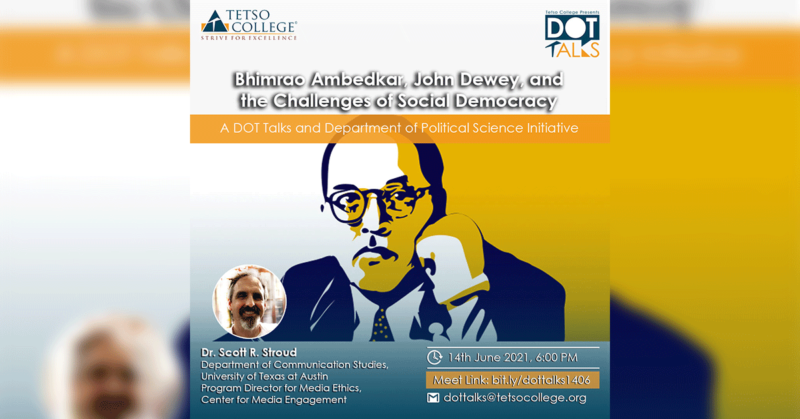Date : 14th June 2021
Time : 6:00 PM
Meet Link : bit.ly/dottalks1406
DOT Talks in collaboration with the Department of Political Science brings you an Online Lecture Series titled ‘The Relevance and Significance of Dr. B.R. Ambedkar: Today & Tomorrow’. The event will be graced by internationally recognized academicians, thinkers, and also our students who will be delivering consecutive lectures.
The fifth lecture in the series is called ‘Bhimrao Ambedkar, John Dewey, and the Challenges of Social Democracy’ and will be delivered by Dr. Scott R. Stroud on 14th June 2021 at 6:00 PM.
Abstract: What does democracy mean? What does democracy demand of its citizens and the government? These are important contemporary questions for both India and the United States of America. Both are shaken by a growing recognition of the need for social justice, as well as the necessity of overcoming political division and partisan strife. In this talk, Dr. Scott R. Stroud will explore Bhimrao Ambedkar’s thoughts on social democracy, with particular reference to his educational experiences at Columbia University, as a historically-informed way to talk about the challenges and promises of democracy in a time of division. It was during his years at Columbia University in New York City that Ambedkar was first exposed to the thought of John Dewey, America’s prophet of democracy. Ambedkar would frequently turn to Dewey’s thought as a source of ideas, and as a philosophy to build on, revise, or even resist. Late in his life, Ambedkar wrote to his Savita, his wife, upon hearing of John Dewey’s death in 1952 that “I am so sorry. I owe all my intellectual life to him. He was a wonderful man.”
Even though Ambedkar was specializing in economics during his time at Columbia University, Dewey’s philosophy courses left an identifiable mark on the political and social reformer. Beyond merely noting this influence, this paper will bring to light unexplored details about the content of Dewey’s courses with Ambedkar, as well as the books authored by Dewey that engaged Ambedkar’s attention, all with the intention of spelling out the sources and vectors of pragmatist influence and appropriation by Ambedkar in the Indian context.
As will be shown, Ambedkar’s reconstruction of Buddhism later in his life was a continuation with this engagement with Dewey, social democracy, and the demands of pursuing a lasting state of social justice. Always a pragmatist democrat, Ambedkar strove to preserve what was useful in tradition while throwing out what was harmful or dead. Seen in this way, his controversial re-writing of Buddhism in his last years as a scientific, rational faith of equality can be understood as an extension of his Deweyan inheritance. In his magisterial book, The Buddha and His Dhamma, Ambedkar wanted to preserve religion’s importance in the Indian context, but all while instantiating the pragmatist concern for creating and maintaining lasting communities animated by shared values. Ambedkar’s reconstructed Buddhism becomes part of his reconstruction of pragmatism, adding to what we know of this Indian leader’s thought—as well as to the stories we tell about pragmatism’s international travels and evolution.
About the Speaker: Dr. Scott R. Stroud is an Associate Professor of Communication Studies at the University of Texas at Austin. He writes on various topics in ethics, rhetoric, and philosophy. He is the author of two academic books, John Dewey and the Artful Life and Kant and the Promise of Rhetoric. He is the co-founder of the first “Center for John Dewey Studies” in India at Savitribai Phule Pune University. Currently he is completing a book manuscript that tells the story of Bhimrao Ambedkar’s brush with Deweyan pragmatism at Columbia University during 1913-1916 and how it shaped his innovative pursuit of social justice in India.

